Deputy PM hails 40 years of Singapore alumni excellence
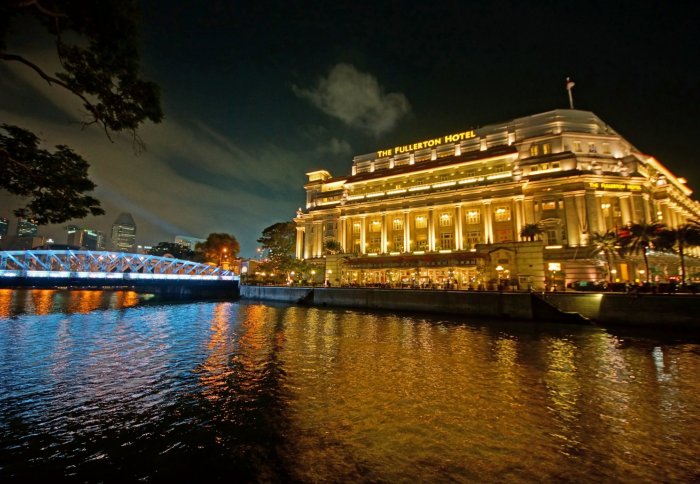
One of Imperial's most active and longest running alumni groups celebrated four decades of success this week.
Singapore’s Deputy Prime Minister Teo Chee Hean (MSc Computing 1977) addressed 300 alumni and friends at the Fullerton Hotel, for the Imperial College Alumni Association’s (ICAAS) 40th anniversary gala dinner. He argued that Singapore must keep innovating in a fast-changing world, as the nation aspires to be “one of the key nodes in the global network of knowledge and innovation."
The College’s 2,700+ alumni in Singapore include the Republic’s Acting President JY Pillay (Mechanical Engineering 1956), who took over this month after President Tony Tan – who visited Imperial as part of his 2014 state visit – concluded his term. Business leader Koh Boon Hwee (Mechanical Engineering 1972) and Singapore’s first ever Schwarzman scholar Lejon Chua (Chemical Engineering 2014) also graduated from the College. Singapore has one of the highest concentrations of Imperial alumni per capita anywhere in the world.
Imperial and the UK enjoy a deep and special relationship with Singapore.
– Professor Alice Gast
President
The special event took place one week after Imperial celebrated the official opening of LKCMedicine, the College’s joint medical school with Nanyang Technological University (NTU) in Singapore, and was attended by the School’s Dean Professor James Best.
The evening was organized by Jayson Goh (Electrical and Electronic Engineering 1998), President of ICAAS and his executive committee. Mr Goh, Managing Director for airport operations management at Singapore’s Changi Airport, also serves on Imperial’s Court. He said: “ICAAS can continue to be the link between Imperial College and our many graduates who are pushing the innovation frontiers.”
During Mr Goh’s speech, the audience applauded Professor Phua Kok Khoo, the founding president of ICAAS and a generous philanthropist, who initiated the group in 1977.
Wisdom and leadership
Professor Alice Gast, President of Imperial College London, said: “We need wisdom and leadership in the world today. Spending the last week in Singapore has been refreshing. I’m always struck by the pace of change. This neighbourhood around the Marina was simply not here when you celebrated the 25th anniversary of the ICAAS. But I admire Singapore and Singaporeans for more than their effective city planning and construction.
“You are worldly yet loyal to your homeland. You are innovative yet realistic. You celebrate wisdom and age while giving young leaders a tremendous amount of responsibility. You are inspiring to us at Imperial and I believe that our excellent university is enhanced by our Singaporean students and alumni.”
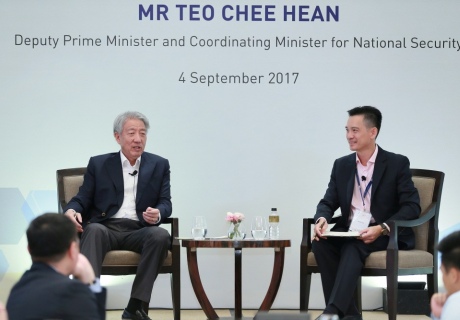
Deputy PM Teo Chee Hean with ICAAS President Jayson Goh
The Deputy Prime Minister of Singapore, Teo Chee Hean, outlined his vision for science and innovation as new engines of economic growth, staying on on for a lively Q&A session. He also took the chance to reminisce about his “very good year at Imperial College”, and his pleasure at seeing some of his old classmates at the ICAAS dinner.
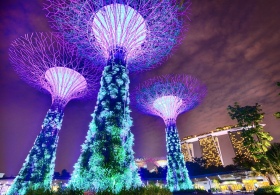 He spoke about Singapore’s historic “shift from a labour-intensive to a skills intensive economy, now transitioning to an innovation driven economy.” The nation is “reaching a point where we can reap some of our returns from earlier investments, including long term ones like funding PhDs at Imperial,” he said.
He spoke about Singapore’s historic “shift from a labour-intensive to a skills intensive economy, now transitioning to an innovation driven economy.” The nation is “reaching a point where we can reap some of our returns from earlier investments, including long term ones like funding PhDs at Imperial,” he said.
Singapore’s government will invest $19 billion in research, innovation and enterprise, “focusing on advanced manufacturing and engineering, health and biomedical sciences, urban solutions and sustainability, and services and the digital economy”, as part of the RIE2020 plan, he explained.
The DPM commented on Singapore’s move towards a cashless society, the potential for Internet of Things tech for public services including smart streetlights and ASEAN’s prospect for growth, while underlining the importance of “people like the alumni of Imperial College [who] are comfortable with technological change.”
Risk-takers and innovators
DPM Teo spoke of his “secret happiness when young people quit steady jobs at multinationals to try a startup, and be willing to fail in the process,” something that growing numbers of Imperial’s Singaporean alumni and students are doing.

President Gast highlighted one such innovator, Val Yap, “a fintech entrepreneur pioneering the field of insurtech or insurance technology. Val completed her MSc in Management at Imperial in 2012. In 2016 she founded PolicyPal, a rapidly growing startup in Singapore that allows customers to organise and track all their insurance products in one dashboard. Val's team is raising venture funding, working with financial institutions and the Monetary Authority of Singapore and looking to expand the business to other countries. Earlier this year, Forbes Magazine honoured Val as one of Asia's '30 under 30' rising stars.”
Imperial has more than 400 Singaporean students: the highest proportion at any UK university. 40 current students, all members of Imperial College Singapore Society, attended the gala, including a group of musical performers.
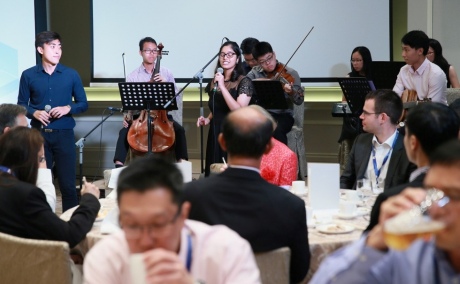
Current SingSoc students performed at the gala
When asked for his advice to current Imperial students, the DPM said: “There’s a new world with many opportunities... When you go to a university like Imperial you learn two things: first, the specific subject you major in; the other thing you learn is how to organise your knowledge and thinking. You learn rigour and the method of how to think about the world around you.”
He added: “It’s important to have a discipline of your own to structure your thinking – whether that’s physics, biology, economics, history or literature – but do it in your own way. You must know how to understand these thing so you appreciate your own discipline and have the humility to take on other ideas outside your field.”
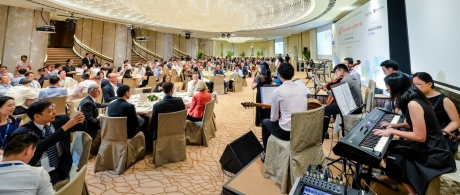
Offer holders joined the celebrations, including Gavin Soh who will start his degree in Mechanical Engineering at the end of the month. He said: “Imperial appealed because of my interest in robotics, which I believe will transform society. Unlike some other universities, Imperial has very relevant links with industry.” Gavin is also excited by Imperial’s work in aerial robotics and is considering joining DroneSoc.
Global network
Current and future students rubbed shoulders with alumni leaders from Hong Kong, Beijing, Shenzhen and the wider region, as well as Singapore. They were joined by Britain’s High Commissioner for Singapore Scott Wightman.
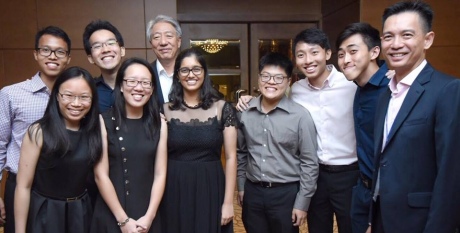
DPM Teo met current students
Imperial’s new Dean of the Faculty of Engineering Professor Nigel Brandon, who is also a visiting professor at NTU, met with alumni, including his former student in Chemical Engineering, Teo Eng Dih, who now serves as a senior advisor on climate change in the Prime Minister’s Office.
Several alumni looked back fondly on the opportunities – for their careers and wider lives – that Imperial and London afforded them.
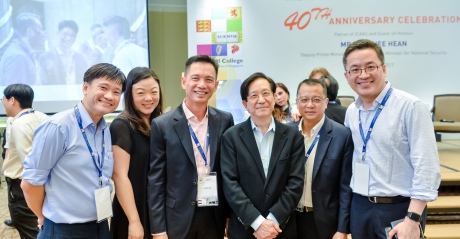
Yang Yang Zhang (PhD Bioengineering 2009), now Director of Debt Capital Markets for Bank of China International, developed her interest in finance as a student, interning at Barclays in London. She “enjoyed London because there’s so much to do – you can never get bored. Imperial is in close proximity to the museums, the best shopping and places to go clubbing. The diversity of people at Imperial and in London is a real appeal.” Originally from China, Dr Zhang stays in touch with many Chinese and Singaporean Imperial alumni via WeChat.
Yu Han Wong, COO of A-Smart Holdings, agreed that “there’s lots to do in London, like visit Hyde Park or the West End.” His career gained from “the rigorous training of the mind” in his Mechanical Engineering degree, “but most importantly I met my wife at Imperial.”
Many of those responsible for Singapore’s dynamic national planning and infrastructure were in the audience, including alumni Siow Chong Goh (Computing 1995) and Wen Tung Chiu (MEng Chemical Engineering and Chemical Technology 1996) who work together at Singapore’s Urban Redevelopment Authority. Mr Goh only recently joined ICAAS but suspects this will be “the first of many events” he attends.
Top image credit: Allie_Caulfield.
Article text (excluding photos or graphics) © Imperial College London.
Photos and graphics subject to third party copyright used with permission or © Imperial College London.
Reporter
Andrew Scheuber
Communications Division
